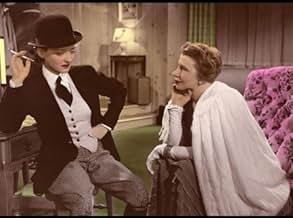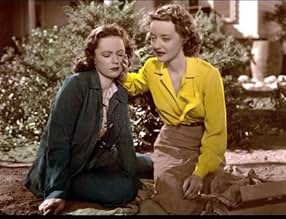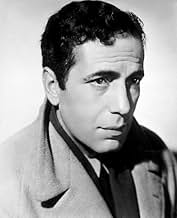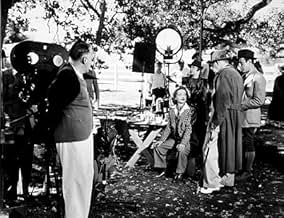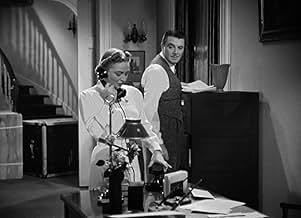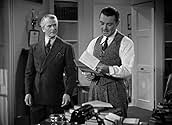NOTE IMDb
7,4/10
13 k
MA NOTE
Ajouter une intrigue dans votre langueA young socialite is diagnosed with an inoperable brain tumor, and must decide whether or not she'll meet her final days with dignity.A young socialite is diagnosed with an inoperable brain tumor, and must decide whether or not she'll meet her final days with dignity.A young socialite is diagnosed with an inoperable brain tumor, and must decide whether or not she'll meet her final days with dignity.
- Réalisation
- Scénario
- Casting principal
- Nommé pour 3 Oscars
- 5 victoires et 4 nominations au total
Black Ace
- Judith's Horse
- (non crédité)
Marian Alden
- Judith's Friend
- (non crédité)
Wilda Bennett
- Judith's Friend
- (non crédité)
Diane Bernard
- Lucy - a Servant
- (non crédité)
Avis à la une
Bette Davis always cited this as her favourite role: it is probably on a par with Margo Channing in ALL ABOUT EVE as the part which fans identify with as definitive Davis. Naturally, this 1939 film will look a little musty, corny and cliched to modern day viewers, but the poignant sincerity in which Davis instilled via her magnificent performance still has the ability to leave the viewer in helpless tears: you can be dumbfounded to think that something so obviously aimed at your tear ducts could succeed to induce the flow so completely and spontaneously! The role is based upon a 1934 play in which Tallulah Bankhead flopped. The character of Ann King was written especially for the film by director Edmund Goulding: as a kind of Greek Chorus so Judith wouldn't have to complain about the inevitable. Geraldine Fitzgerald, in her American film debut, does a wondrous job with the part of Ann: a beautifully etched supporting performance. As Michael O'Leary, Humphrey Bogart is unfortunately inept in the Irish brogue department (why couldn't they have simply cut out the accent?) and George Brent is adequately wooden as Dr. Frederick Steele whom Judy marries. Davis slams through a gooey collection of cliches in her nerviest style during the early segments but her metamorphasis into a vibrantly humbled married woman is quite a striking contrast to the selfishly brazen spoiled heiress: truly a multi-faceted performance. Ronald Reagan gets to play Alec, one of Judy's drunken swains, and Cora Witherspoon is memorable as the snotty Carrie. The last twenty minutes of the film are expertly crafted and timelessly tear-jerking: the movie sold more kleenex than any other of its day.
By today's standards, "Dark Victory" might seem cliched. Of course, that could be because it was so greatly copied! Here is Bette Davis, a star in the fullness of her talent and ability. Bette simply shines; she owns this film from first frame to last. Ably supported by a wonderful cast (including a somewhat mis-matched Humphrey Bogart as an Irish-brogued horse trainer), it is still difficult to watch the film and not be constantly anticipating Bette's appearance in any scene she isn't in. The ending, even in those days, might have turned out either wimpy or waspish. In Bette's hands, it is neither. It works in a way that literally drains one of emotions. I might also add that, while revealing only a bare back, Bette shows more sensuality than a dozen of today's more "open" actresses.
There is an old disparaging adage about "showing the full gamut from a to b," in this movie Bette not only shows A to Z, but some letters that haven't been invented yet.
Despite my gushing over Ms. Davis, the film is solid in all departments. If you wish to experience when melodrama is great movie-making, see this film.
There is an old disparaging adage about "showing the full gamut from a to b," in this movie Bette not only shows A to Z, but some letters that haven't been invented yet.
Despite my gushing over Ms. Davis, the film is solid in all departments. If you wish to experience when melodrama is great movie-making, see this film.
You've been feeling somewhat ill, and just not with it, your vision gets quite blurred, but you admit it, so it's off to see the doc, though you're in for quite a shock, an operation is required to get you fit. You start to mend, but there's something new you feel, seems you've fallen for the man who's made you heal, emotions at a high, but there are things you've been denied, then indiscretion leads you to a big reveal.
There's some racy dialogue to contend with, but the performances of both Bette Davis and George Brent are divine, in what is not your typical boy meets girl story of the time. You also get the added bonus of Humphry Bogart, although his Irish brogue would never earn him any rewards, and a future President provides some small support.
A film of its time but plenty to enjoy still today.
There's some racy dialogue to contend with, but the performances of both Bette Davis and George Brent are divine, in what is not your typical boy meets girl story of the time. You also get the added bonus of Humphry Bogart, although his Irish brogue would never earn him any rewards, and a future President provides some small support.
A film of its time but plenty to enjoy still today.
Judith is a wealthy Long Island society girl given to a dizzy lifestyle
Self-assured of her affluence and her faculty over men, she is unprepared for tragedy, which strikes in the form of a brain tumor
The underlying bravery and courage with which she faces this physical suffering eventually demonstrates the woman of substance that she is
Among her friends is Ann King (Fitzgerald), her secretary, and handsome young Alex Hamm (Reagan), who directs her toward brain specialist Dr. Frederick Steele (Brent). The doctor diagnoses her illness as one which will end her life within a year Judith falls in love with him and accepts his proposal of marriage When she discovers that her tumor is calamitous, she rejects the doctor's proposal considering it an act with compassion
Davis provides scene after scene with the special magic only she was able of bringing vividly
Swept into the current of events was Bogart playing an Irish horse trainer, who fails in an attempt to make love to her, yet encourages her to enjoy her time with her true love, George Brent
The film was remade in 1963 as "Stolen Hours" with Susan Hayward, and as a 1976 TV movie under its original title with Elizabeth Montgomery
Among her friends is Ann King (Fitzgerald), her secretary, and handsome young Alex Hamm (Reagan), who directs her toward brain specialist Dr. Frederick Steele (Brent). The doctor diagnoses her illness as one which will end her life within a year Judith falls in love with him and accepts his proposal of marriage When she discovers that her tumor is calamitous, she rejects the doctor's proposal considering it an act with compassion
Davis provides scene after scene with the special magic only she was able of bringing vividly
Swept into the current of events was Bogart playing an Irish horse trainer, who fails in an attempt to make love to her, yet encourages her to enjoy her time with her true love, George Brent
The film was remade in 1963 as "Stolen Hours" with Susan Hayward, and as a 1976 TV movie under its original title with Elizabeth Montgomery
I was probably 12 years old when I first saw this film on TV. It was shown in two parts and I didn't get to see the second part, so my mother had to tell me what happened.
Forty years later, I still cry every time I see "Dark Victory." It remains one of my favorite films for sheer use of Kleenex and my favorite Bette Davis movie, "All About Eve" being right up there with it. I even saw it on the big screen in a revival house when I was in college.
Yes, some of the dialogue sounds corny now, like the good doctor saying, "Women never meant anything to me before". But the interesting thing is, when I did see it with an audience, though they laughed as some inappropriate spots, by the end you could hear the sobs on the next block.
There have been comments that Humphrey Bogart seems miscast in a somewhat minor role. I frankly thought he was just fine. He certainly was short enough to be a jockey and he pulled off the brogue.
I'm sure it's confusing for some to see him in such a small role in 1939 when only a few years later, he was a total superstar. But he was under contract to Warners and kicked around for years before "High Sierra" and "Casablanca".
He obviously wasn't working when "Dark Victory" was cast, so why let him sit around taking a salary and do nothing?
And of course we have Ronald Reagan as a playboy. I actually find him delightful in this film. It called for charm and he had it.
In today's fast-paced world, there's nothing stronger than a message about time and our use of it. "Oh, give me time for tenderness...just give me time."
Like Bette's character, I want to hear that song again too, in many more viewings of "Dark Victory."
Forty years later, I still cry every time I see "Dark Victory." It remains one of my favorite films for sheer use of Kleenex and my favorite Bette Davis movie, "All About Eve" being right up there with it. I even saw it on the big screen in a revival house when I was in college.
Yes, some of the dialogue sounds corny now, like the good doctor saying, "Women never meant anything to me before". But the interesting thing is, when I did see it with an audience, though they laughed as some inappropriate spots, by the end you could hear the sobs on the next block.
There have been comments that Humphrey Bogart seems miscast in a somewhat minor role. I frankly thought he was just fine. He certainly was short enough to be a jockey and he pulled off the brogue.
I'm sure it's confusing for some to see him in such a small role in 1939 when only a few years later, he was a total superstar. But he was under contract to Warners and kicked around for years before "High Sierra" and "Casablanca".
He obviously wasn't working when "Dark Victory" was cast, so why let him sit around taking a salary and do nothing?
And of course we have Ronald Reagan as a playboy. I actually find him delightful in this film. It called for charm and he had it.
In today's fast-paced world, there's nothing stronger than a message about time and our use of it. "Oh, give me time for tenderness...just give me time."
Like Bette's character, I want to hear that song again too, in many more viewings of "Dark Victory."
Le saviez-vous
- AnecdotesOff-screen, Bette Davis suffered a nervous breakdown during filming as a result of her crumbling marriage to Harmon Nelson. Reportedly, producer Hal B. Wallis convinced Davis that she could benefit by using these real-life emotions of pain and loss to enhance the portrayal of her character. Meanwhile, Davis's marital problems didn't prevent her from embarking on an affair with co-star George Brent. Davis and Brent appeared in a total of 11 movies together.
- GaffesWhen the setting changes to Vermont towards the end of the film, there is snow on the ground and it is obviously winter. Yet most of the trees in front of the house still have leaves on them.
- Versions alternativesAlso available in computer-coloured version.
- ConnexionsFeatured in Stars on Horseback (1943)
- Bandes originalesOH, GIVE ME TIME FOR TENDERNESS
(1939) (uncredited)
Music by Edmund Goulding
Lyrics by Elsie Janis
Sung by Vera Van
Meilleurs choix
Connectez-vous pour évaluer et suivre la liste de favoris afin de recevoir des recommandations personnalisées
Détails
Box-office
- Montant brut mondial
- 345 $US
- Durée
- 1h 44min(104 min)
- Couleur
- Mixage
- Rapport de forme
- 1.37 : 1
Contribuer à cette page
Suggérer une modification ou ajouter du contenu manquant


